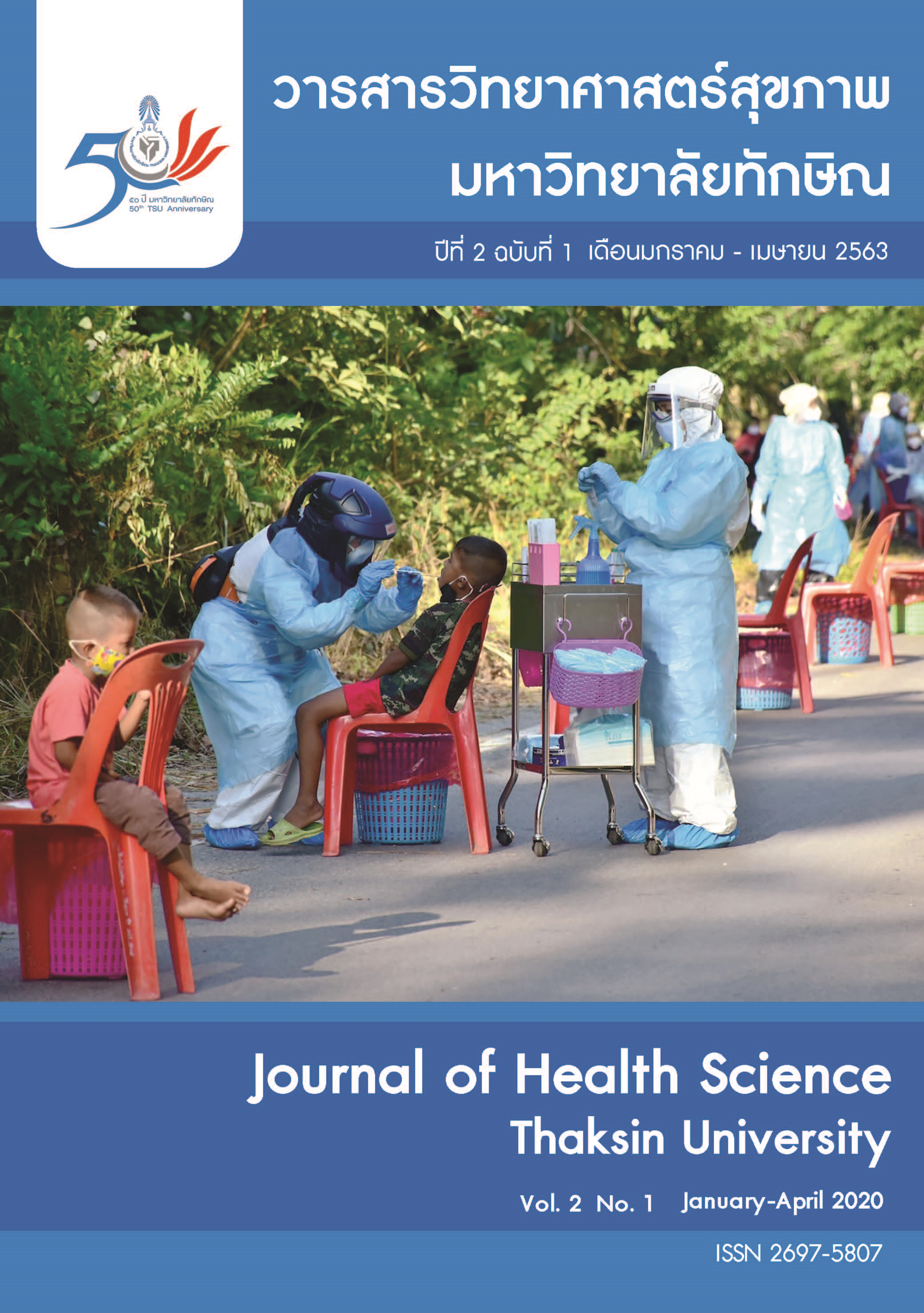Contamination of Organophosphate and Carbamate Residues and Methods of Washing Fresh Vegetables in the Market, Surat Thani Province: A Case Study of Pho Wai Fresh Market
Main Article Content
Abstract
This experimental study aimed to investigate the contamination of organic chemical phosphorus and carbamate residues and methods of washing fresh vegetables in Pho Wai Market, Mueang District, Surat Thani Province. Samples were collected from November 2018 to February 2019. The samples were quota sampling 5 fresh vegetables including; chili, cucumber, cabbage, yard-long bean, and eggplant from 10 vegetable panels. In total, 50 fresh vegetables were tested the contamination using the Test Kit of MJPK and studying the 4 washing methods consisted of washing with normal water, sodium bicarbonate, vinegar and vegetable detergent. The data were analyzed using descriptive statistics. The results showed that the vegetables were at a safe, unsafe and very unsafe at 64, 14, and 22 percent respectively. The methods of washing fresh vegetables at unsafe and very unsafe levels of 3 types of vegetables such; chili, cabbage, and cucumber found that washing with sodium bicarbonate, and vegetable detergent was 100, 66.66 percent, respectively. Washing with plain water and water mixed vinegar reduced the similar toxic residues was 33.33 percent. Hence, the given importance of washing fresh vegetables before eating with sodium bicarbonate will reduce the risk of receiving pesticide residues, organophosphate and carbamate. The result was found that the results of the examination of pesticide residues showed that the examination of 50 vegetable pesticide residues was at a safe, unsafe, and very unsafe level were 64, 14, and 22 percent, respectively. The comparison of the effectiveness of washing fresh vegetables at unsafe and very unsafe levels of 18 samples (36%) was sodium bicarbonate washing, and vegetable washing in reducing toxic residues was 100, 66.66 percent, respectively. Both of washing with vinegar and washing with ordinary water effective in reducing toxic residues were 33.33 percent. This should pay attention to washing fresh vegetables before eating with sodium bicarbonate, which will reduce the risk of receiving pesticide residues the organophosphate and the carbamate.
Article Details
References
Toxicology Information Center. Department of Medical Sciences. [Internet] 2019 [Cited 25 January, 2020] Available from :https://webdb.dmsc.moph.go.th/ifc_toxic/a_tx_1_001c.asp?info_id=396.
National Cancer Institute. Department of Medical Services. [Internet] 2019 [Cited 23 April, 2019] Available from: http//www. nci.go.th/th/Knowledge/download8. pdf.
Chemicals daily life. Faculty of Pharmacy, Silpakorn University. [Internet] 2017 [Cited 29 March, 2019] Available from: https://oldweb.pharm. su.ac.th/ chemistry-in-life/d026.html.
Department of Agriculture. [Internet] 2019 [Cited 25 January, 2020] Available from: http: https://service.nic.go.th/em.dashboard.php?id=5.
Sukamolson S, Sriviriyanuparp W,Kulsomboon V. Priority, prevalence and geographic distribution of unsafe products in Thailand. Journal of Health Systems Research 2016; 37: 65–79.
Phakasama P, Saesin S, Sutin S.Detection of Organophosphate and Carbamate Pesticides Residues in Vegetables in Samutprakarn Province. Journal of Association of Private Higher Education Institutions of Thailand 2017; 5(1): 22-30.
Phuphalee T. Prevalence of pesticide residues in vegetables from markets and supermarkets in Muang district, Maha Sarakham province. Thai Journal of Pharmacy Practice 2017; 8(2): 399-409.
Senthong P, Wiwat L, Patseethong S, Srihatai K. The Effectiveness of Vegetable Washing Liquid on the Type of Pesticides and the Concentration of Formalin Residues in Vegetables. KKU Research Journal 2018; 18(3): 1-10.
Koranee R, Prangsurang P. Study comparing the effectiveness of washing method to eliminate pesticide residues in fresh vegetables. FDA journal. 2016; January-April: 34-42. Thai.
Thai Health Promotion Foundation. Vegetables for life. [Internet] 2019 [Cited 10 May, 2019] Available from: https://resource.thaihealth.or.th/media/thaihealth/12827.
Department of Agriculture. [Internet] 2020 [Cited 25 January, 2020] Available from: https://www.doae.go.th/library/.


